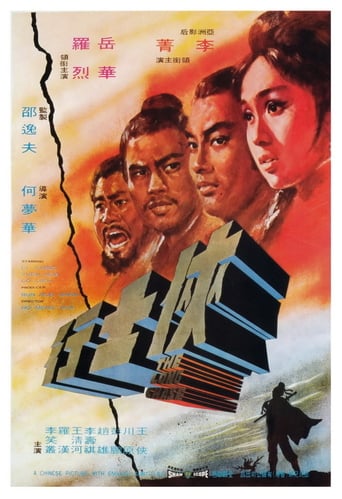Brian Camp
THE LONG CHASE (1971) is a run-of-the-mill Shaw Bros. swordplay film that benefits from a fast pace, plenty of action and three dependable leading players. Yueh Hua stars as an assassin who flees after killing a hated prime minister, with Lo Lieh as the relentless imperial guard who pursues him to a remote village being terrorized by bandits. When Yueh takes over the identity of a county officer newly assigned to the village, his ruse is assisted by a pretty innkeeper's daughter (Li Ching) who insists to Lieh that Yueh is indeed the county officer and happens also to be the cousin who was betrothed to her as a child. The confused innkeeper is persuaded by his daughter to support the ruse, thus delaying Lieh's efforts to arrest the wanted man.Pretty soon, both Lieh and Yueh have their hands full with the bandits, but manage to beat them back. In retaliation, the bandits kidnap the innkeeper's daughter and hold her as hostage, necessitating a raid by the two heroes on the bandits' stronghold. Eventually, Lieh has to make good on his commitment to arrest Yueh or risk a sentence of death himself at the Emperor's court. This creates a powerful moral dilemma for both men. Parts of the film, including the whole final sequence, display a striking resemblance to the old Warner Bros. crime drama, THEY MADE ME A CRIMINAL (1939), in which detective Claude Rains pursues fugitive boxer John Garfield to a ranch for wayward boys (the Dead End Kids) in the Southwest and is torn over whether to arrest him or not after seeing what a positive influence he's having on the boys. This may not be the deepest plot for a Shaw Bros. production, but it benefits from assured direction by Ho Meng-hua (the MONKEY KING quartet), clever staging of the many fights, a tight running time (82 min.) and charismatic star performances. Yueh Hua (THE MONKEY GOES WEST, COME DRINK WITH ME, many others) has more fight scenes here than in any other movie I've yet seen him in and he does most of his own stunts as well. Lo Lieh, a frequent Shaw Bros. star both in hero and villain roles, is as good as I've ever seen him and Li Ching, one of the many beautiful Shaw Bros. female stars to emerge in the 1960s, is almost as dazzling and vibrant here as she was in HONG KONG RHAPSODY (1967), in which she played the central role.


